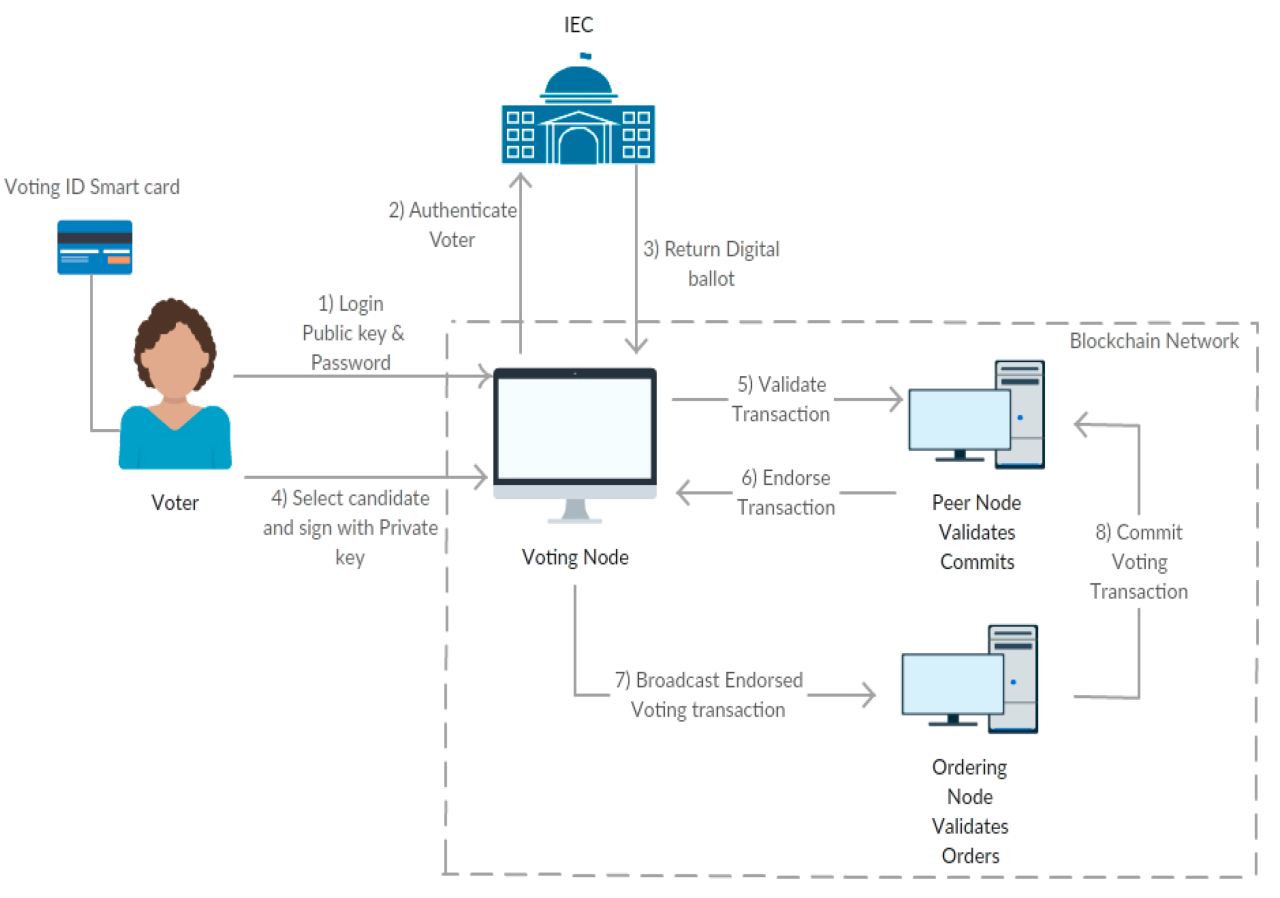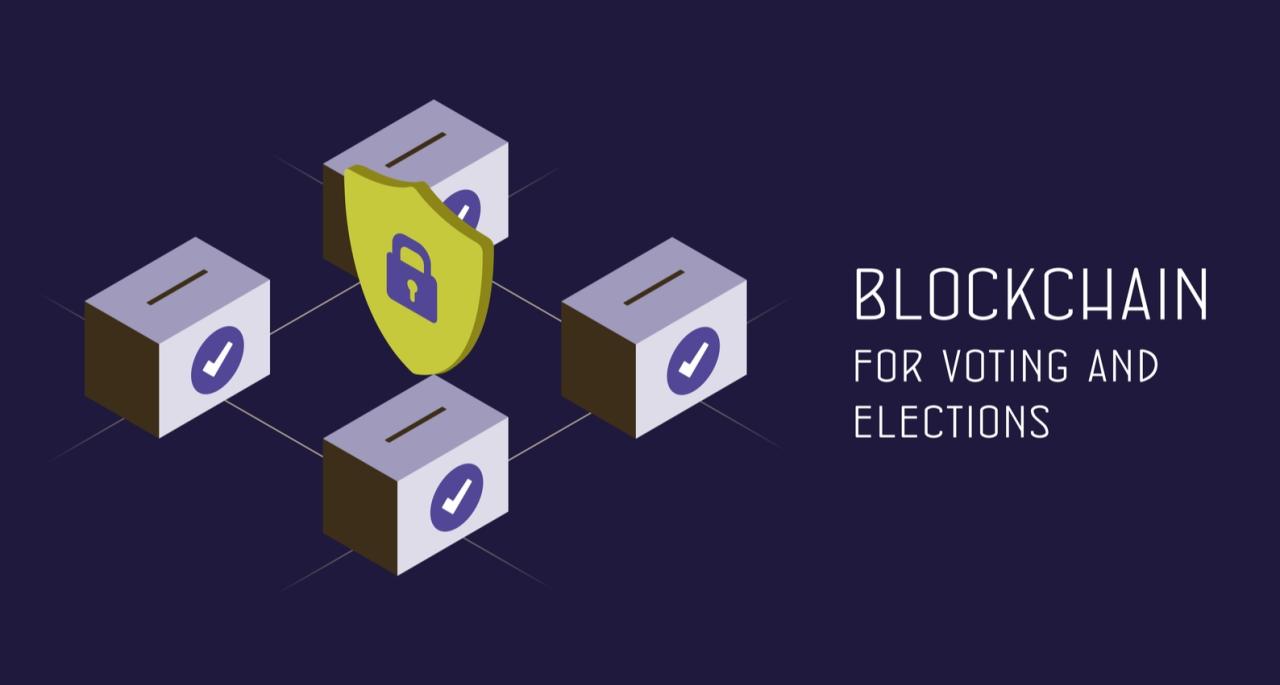Blockchain Voting Systems
Blockchain voting systems sets the stage for this enthralling narrative, offering readers a glimpse into a story that is rich in detail and brimming with originality from the outset.
As we delve into the world of blockchain technology applied to voting systems, we uncover a realm of possibilities that promise secure, transparent, and automated processes that could reshape the way we participate in elections.
Overview of Blockchain Voting Systems

Blockchain technology has revolutionized various industries, including the voting sector. In the context of voting systems, blockchain refers to a decentralized and transparent digital ledger that records all transactions securely. Each block contains a timestamp and a link to the previous block, making it nearly impossible to alter the data, ensuring the integrity of the information stored.
Using blockchain for voting brings numerous benefits, such as increased security and transparency. The decentralized nature of blockchain eliminates the need for a central authority, reducing the risk of tampering or fraud. Additionally, the transparent nature of the technology allows voters to track their votes and verify the results, enhancing trust in the electoral process.
However, implementing blockchain in voting systems also poses challenges and limitations. One major concern is the issue of scalability, as processing a large number of transactions on the blockchain can be time-consuming and costly. Moreover, ensuring the privacy of voters while maintaining transparency remains a challenge that needs to be addressed in blockchain-based voting systems.
Security and Transparency
- Blockchain technology provides a secure and tamper-proof way to store voting records.
- Smart contracts can be used to automate the voting process and ensure accuracy.
- The transparent nature of blockchain allows for real-time tracking of votes, ensuring integrity.
- Eliminates the risk of double voting or other forms of fraud.
Features of Blockchain Voting Systems

Blockchain voting systems offer a range of features that enhance the trust, security, and transparency of the voting process. Let’s explore some key aspects:
Decentralized Nature of Blockchain
- Blockchain technology ensures that there is no central authority controlling the voting process, making it resistant to manipulation or fraud.
- By distributing the data across a network of nodes, blockchain enhances the security and integrity of the voting system.
Verifiability and Auditability of Votes, Blockchain voting systems
- Every vote recorded on the blockchain is immutable and transparent, allowing voters to verify that their vote has been accurately counted.
- Auditors can easily trace back and verify the entire voting history, ensuring the integrity of the election results.
Role of Smart Contracts
- Smart contracts are self-executing contracts with the terms of the agreement directly written into code. In the context of voting systems, smart contracts can automate the entire voting process, ensuring accuracy and efficiency.
- These contracts can execute predefined rules and conditions, eliminating the need for intermediaries and reducing the risk of human error or manipulation.
Implementation of Blockchain Voting Systems

Implementing blockchain technology in voting systems has the potential to revolutionize the way elections are conducted, ensuring transparency, security, and efficiency.
Real-World Examples of Blockchain Voting
Several countries and organizations have already started exploring the use of blockchain in their voting processes. For example, Estonia has been using blockchain technology for its e-residency program, which includes online voting. Sierra Leone also made headlines by conducting the first blockchain-based presidential election in 2018.
Steps in Setting Up a Blockchain-Based Voting System
- Choose a suitable blockchain platform: Select a blockchain platform that aligns with the voting requirements, such as Ethereum or Hyperledger.
- Develop a secure voting application: Create a user-friendly application that allows voters to cast their votes securely.
- Implement identity verification: Use blockchain to verify the identity of voters and ensure that each vote is legitimate.
- Set up a decentralized network: Establish a decentralized network of nodes to validate and record the votes securely.
- Audit and test the system: Conduct thorough audits and testing to identify any vulnerabilities and ensure the system’s integrity.
Cost Comparison with Traditional Voting Systems
While the initial setup costs of a blockchain-based voting system may be higher than traditional systems, the long-term benefits outweigh the expenses. Traditional voting systems incur costs related to printing ballots, transportation, and manual counting, which can be significantly reduced with blockchain technology. Additionally, blockchain voting systems offer increased security and transparency, reducing the risk of fraud and manipulation.
Security and Privacy in Blockchain Voting

Blockchain technology plays a crucial role in enhancing the security and privacy of voting data. The decentralized and immutable nature of blockchain ensures that all transactions and data entries are securely stored and cannot be altered without broad consensus.
Enhanced Security Measures
- Blockchain utilizes cryptographic algorithms to secure the data, making it nearly impossible for unauthorized parties to manipulate or tamper with the information.
- The distributed nature of blockchain ensures that the data is replicated across multiple nodes, making it highly resistant to hacking or cyber attacks.
- Each transaction in the blockchain is time-stamped and linked to the previous transaction, creating a transparent and auditable voting trail.
Privacy Implications
- Blockchain voting systems ensure the anonymity of voters, as the data is encrypted and stored securely without revealing individual identities.
- Voters can have confidence that their personal information and voting choices are kept confidential and protected from any unauthorized access.
- The use of blockchain technology minimizes the risk of data breaches or leaks, safeguarding the privacy of all participants in the voting process.
Threats and Vulnerabilities
- Despite its robust security features, blockchain-based voting systems are not immune to certain threats, such as 51% attacks or malicious nodes attempting to manipulate the data.
- To mitigate these risks, implementing additional security protocols, such as multi-factor authentication and encryption, can further strengthen the security of the voting system.
- Regular audits and monitoring of the blockchain network can help detect any suspicious activities and prevent potential vulnerabilities from being exploited.
Future of Blockchain Voting Systems

As blockchain technology continues to advance, the future of blockchain voting systems holds great promise in revolutionizing the way elections are conducted. With increased security, transparency, and accessibility, blockchain has the potential to significantly impact the democratic process.
Scalability Challenges of Blockchain Technology
One of the main challenges facing blockchain technology in handling large-scale elections is scalability. As more transactions are added to the blockchain, the network can become congested, leading to slower processing times and higher fees. This can be a significant barrier to implementing blockchain voting systems on a national or global scale.
- Implementing sharding techniques to divide the blockchain into smaller, more manageable parts
- Exploring off-chain solutions to reduce the burden on the main blockchain network
- Developing consensus algorithms that are more efficient and scalable
Impact of Blockchain on Voter Turnout
Blockchain has the potential to increase voter turnout and participation by providing a more secure and convenient way for people to cast their votes. By enabling voters to participate from anywhere in the world using a secure digital platform, blockchain voting systems can remove many of the barriers that prevent people from voting.
- Increasing accessibility for remote and marginalized communities
- Enhancing trust in the electoral process through transparent and tamper-proof technology
- Streamlining the voting process to make it more convenient and user-friendly
Common Queries: Blockchain Voting Systems
How does blockchain technology ensure secure voting?
Blockchain’s decentralized nature and cryptographic security measures make it virtually tamper-proof, ensuring the integrity of the voting process.
What are the potential limitations of implementing blockchain in voting systems?
Challenges such as scalability issues and regulatory concerns may hinder widespread adoption of blockchain voting systems.
Can blockchain voting systems increase voter turnout?
By providing a more secure and convenient voting experience, blockchain systems have the potential to boost voter participation in elections.






